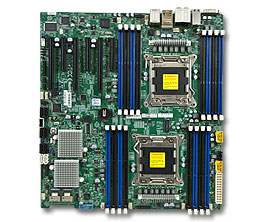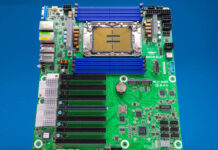Supermicro is releasing a new dual LGA 2011 workstation motherboard which is very much a competitor to the ASUS Z9PE-D8 and EVGA SR-X Classified although it is clearly targeted at systems integrators who are also using a Supermicro workstation chassis. Since the EVGA SR-X Classified and ASUS Z9PE-D8 will not overclock the Intel Xeon E5-2600 series CPUs much if at all, those boards are now more comparable to the Supermicro offering. Let’s take a look at what Supermicro’s workstation lineup offers.
At first look, it seems identical to most other dual LGA 2011 motherboard can take dual Intel Xeon E5-2600 CPUs. Like other dual Xeon E5 motherboards, you will need to install two Intel Xeon CPUs to access all of the available PCIe slots which this board comes with because the PCIe 3.0 controllers are onboard each CPU. Lets have a closer look under the bonnet to see what makes this pair of Supermicro Intel Xeon E5 series workstation motherboards tick:
Key Features Supermicro X9DA7 & X9DAi

- Dual socket R (LGA 2011) supports Intel Xeon processor E5-2600
- Intel® C602 chipset; QPI up to 8.0GT/s
- Up to 512GB DDR3 1600MHz ECC Registered DIMM; 16x DIMM sockets
- Expansion slots: 3 x16 PCI-E 3.0, 2 x8 PCI-E 3.0 & 1 x4 PCI-E 3.0 (in x8)
- Intel® i350 Dual port GbE LAN
- 6x SATA2 and 2x SATA3 ports
- 8x SAS2 (6Gbps) ports via LSI SAS 2308 (X9DA7 only)
- 4x USB 3.0 and 7x USB 2.0 ports
Looking at the above specs the only main difference between these Supermicro Server workstation motherboards and server motherboards is the lack of IPMI features, i.e. Dedicated LAN port and Board management BIOS. Note, unlike the ASUS and EVGA offerings, the Supermicro workstaion Intel Xeon E5 boards have DDR3 DIMM slots that run East-West rather than North-South. It is clear that these motherboards are not meant for consumer cases. Also, the EVGA SR-X classified and ASUS Z8PE-D8 do offer more features when it comes to native USB 3.0 ports. Unlike a lot of server boards, at least Supermicro is including USB 3.0 ports on these motherboards. These days so much easier to install an OS via USB stick and having USB 3.0 speeds to do so makes a huge difference.
Like other workstation motherboards in this class, the Supermicro X9DA7 & X9DAi do come with onboard audio which is not a feature we see with server grade motherboards. There is no onboard video controller but it does come with 3x PCIe 16x Gen 3 slots and 2x PCIe 8x and a single PCIe 4x slots and a LSI SAS 2308 controller making this one very powerful workstation board indeed. Running three PCIe 3.0 video cards in SLI or Crossfire and a set of large SSD’s/HDDs attached to the onboard LSI SAS 2308 (Supermicro X9DA7 only) you can build one mean CAD or video editing setup. With that said, using three double slot video cards renders a 8x and a 4x PCIe slot unusable but one PCIe 3.0 x8 slot is still available closest to the DIMM slots. If you plan to run 3x video/GPU cards and need fast built in drive controller then you will be hard pressed to find a better motherboard than this.




It should be pointed out that this is the only Supermicro board for dual E5-2600 that supports 150W CPUs.
I made a couple systems with this motherboard and the E5-2687 (150W, 8 core) that is between 1.6x and 2x faster than the fastest Xeon x5600 under FEA or CFD load.
Enjoy !!!
Good point, as the E5-2687W is a ‘Workstation CPU’, at 150w x2 your going to need a very good PSU with a single very high current 12v rail, to run both of those bad boys plus everything else.
Would love one of these Mobo’s, but not the bill to keep it running 24/7
Got quite a few more first looks piled up for viewing.
My X9DA7 get delivered tomorrow (Weds). Can’t wait for UPS to get here!!
I’m building a liquid cooled workstation
Always wanted a 2p system, on the cheapside. Thinking the x9dai with two e5-2609s, and 32gb of ram. But ecc/registered stuff is expensive. Would regular desktop ram work in these boards?
Have a look here http://www.newegg.com/Product/Product.aspx?Item=N82E16820239263
Now take away this http://www.newegg.com/Product/Product.aspx?Item=N82E16820239039
The tiny difference is worth the peace of mind that reliability brings ?
I’m just starting to put a kit together for a dual socket machine.
So far it’s the most appealing board out there.
The SRX is not as impressive on the spec side as I thought it would be, considering it’s only a small step up from the SR-2.
You can apparently run 128gb unregistered on this board at 8gb DIMMs, that, is niiiiice!
Have the same board coming next week.. and saw this video of Dynatron CPU coolers.
Which are you using in your builds?
http://www.youtube.com/watch?v=fCJENxxpLLU
Waiting on My X9DA7 too…it’s going to be a huge upgrade with my new system and other parts. Can’t wait :) Will be here next week.
http://www.supermicro.com/support/faqs/faq.cfm?faq=14746
Question
From Supermicro presentation I do understand that X9DAE and X9DA7 support SLI Technology.
Does this mean X9Dai supports SLI as well?
All 3 MBs support Tri SLI on all 3x PCI-Express x16?
Answer
No. X9DA7 doesn’t support SLI.
X9DAE does support two-way GeForce SLI.
X9DAi doesn’t support SLI.